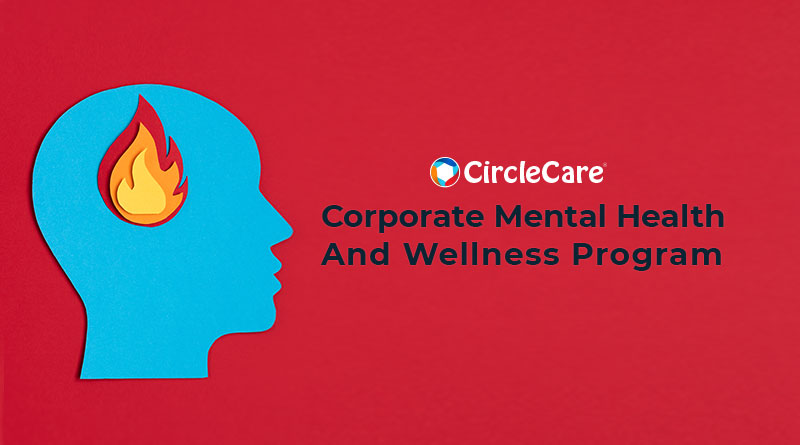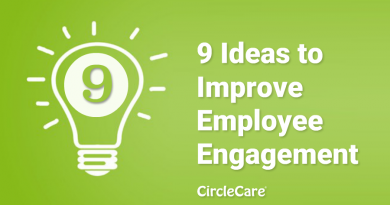Today’s corporate wellness programs appear to concentrate on helping employees improve their health by developing clinical improvement initiatives around specific measures like blood pressure, BMI, cholesterol, glucose, and smoking cessation, among others.
Each of these goals, if met and maintained, can help avoid diabetes, cancer, heart disease, hypertension, and other illnesses that drive up employer’s healthcare costs. As a result, it’s no surprise that a growing number of employers are providing incentives to employees to meet clinical benchmarks.
Reduced healthcare premiums, lower co-pays, and higher costs for smokers are common incentives. However, a focus on mental health and emotional wellness is often missing from corporate wellness programs. While mental health isn’t as easily measured like blood pressure or cholesterol, it deserves equal consideration, especially when considering the costs of poor mental and emotional health.

Corporate Wellness App
CircleCare
Poor mental health is frequently linked to decreased productivity, absenteeism, job abandonment, and higher turnover. According to Jeffrey Kahn, M.D., and Alan Langlieb, M.D., in their book, Mental Health, and Productivity in the Workplace: A Guidebook for Organizations and Clinicians, people with depression symptoms have a fivefold or greater increase in time lost from work compared to those without depression symptoms.
Employers can begin to pay attention to mental health by ensuring that their employees have access to mental health benefits which include an employee engagement platform. These platforms are beneficial because they enable peer support and referrals to mental health professionals and other services while maintaining strict confidentiality.
Employers who have mental health benefits have a significant advantage over those who do not, as they are less likely to experience job burnout, onsite violence, or workplace injury. Before implementing any mental health programs, employers should conduct an assessment of their organizational culture. They need to recognize when cultural factors are affecting people’s resiliency and ability to be emotionally healthy at work.
One employer, for example, may require employees to work 80 hours per week, leaving little time off, whereas another may discourage employees from taking paid vacation time. Such work norms, which are rarely explicitly stated but often implied, fail to provide employees with opportunities to find a healthy balance in their lives, which may have them feeling stressed, discouraged, angry, and unhappy, compromising one’s emotional well-being.
Companies must first ensure that their culture and workplace practices are capable of supporting their employees’ mental health and emotional needs. They must demonstrate that they care about each individual employee and are dedicated to providing the best possible working environment. Employers can have their employees complete a health risk assessment (HRA), which frequently includes questions about mental health, or they can collect data directly from the corporate wellness app to analyze their risks.
The wellness team then created a corporate wellness program based on the three areas of risk. They held educational sessions on overcoming negative thinking, addressing finding a therapist, women, and depression, and, among others, combating depression. They also produced four emotional wellness videos for employees on topics such as writing to meditation, grieving, heal, and forgiveness,
CircleCare addresses stress by providing educational content on job burnout and stress management, encouraging employees to participate in active lifestyle programs (active lifestyle is shown to reduce stress), requiring employees to submit exercise logs, and reminding employees to be more active. To combat obesity, they’ve also created a calorie-burning competition, in which employees compete in daily and weekly step challenges to achieve the highest daily and weekly activity rankings through friendly gamification.
Our customers would never have known about its employees’ mental health issues or physical challenges if it hadn’t been for the CircleCare data. Employers would be best served by informing their employees about the realities of mental health issues that can affect one’s ability to concentrate and work productively. Eating disorders, obsessive-compulsive disorder, stress, drug use, depression, anxiety, and other mood disorders are examples of these issues.
Wellness leaders can use enterprise social networking apps like CircleCare to help people find helpful resources by launching awareness and education campaigns about these illnesses. When employees exhibit symptoms such as a desire to isolate themselves, irritability, and a low tolerance for others, a withdrawal from normal activities, physical aches, and pains, having a resource to turn to for help can likely defuse a potentially dangerous situation.
By providing educational opportunities and increasing awareness of mental illnesses through discussion, organizations are de-stigmatizing those illnesses that keep employees silent in their suffering. People with mental illnesses may benefit from wellness programs because they offer a peer-to-peer support network. According to a recent study, for long-term behavior change, people should not only set attainable goals but also participate in small groups.
People who share similar experiences are less likely to feel alone when they get together. People are more likely to openly discuss topics like coping with work pressures, improving job performance, or dealing with a demanding boss in small groups. Peer support groups are not intended to replace therapy sessions, but they can be therapeutic to those who attend.
Corporate wellness programs that pay equal attention to mental health have risks. First, employees may be afraid of being “outed” if they attend educational sessions or other similar gatherings. Shame is unfortunately frequently linked to workplace mental illness. Employees may be concerned that others will not consider them competent, capable, or reliable.
Regularly and visibly offering sessions, which signals that the company is interested and open to the topic, is the best way to mitigate the risk of low participation. Another way to reduce risk is to request that organizational leaders discuss mental health issues in public forums.
Second, employees may find mental health discussions to be too intrusive and “Big Brother” in nature. For some people, mental health is a deeply personal issue. It can be even more personal than discussing some physical health topics.
Wellness leaders can establish engagement rules at events to mitigate the sensitivity risk. Rules such as not passing judgment on others, not interrupting when someone is speaking, and no cross-talking, for example, may help the sensitive employee feel “emotional safety.”
Third, once mental health is prioritized, there is a risk that an organization will incur costs associated with mental health services and increased pharmaceutical use of psychotropic drugs. Employers must keep in mind that when employees seek treatment, they are less likely to have more expensive hospital stays and are less likely to develop other chronic conditions that will result in higher long-term costs.
Wellness programs in the workplace will continue to evolve. We hope that employers will pay more attention to employee mental health and that the stigma associated with it will fade away. When combined with programs for clinical measure achievement, employers are addressing an employee’s total health by addressing mental health issues and emotional wellness. Everyone becomes stronger, more productive, and happier as a result.









A Corporate Wellness Program will educate employees about various health concerns, identify possible health risks, and prescribe healthy lifestyle changes. These changes will not only improve employee health but also help them achieve their personal goals.
A Corporate Wellness Program will educate employees about various health concerns, identify possible health risks, and prescribe healthy lifestyle changes. These changes will not only improve employee health but also help them achieve their personal goals.
Pingback:Know Your Options When Treating Depression - CircleCare
Pingback:A Proactive Approach to Health and Wellness Starts With Great Insurance Coverage - CircleCare
Pingback:How To Help Your Employees Cope With Tax-Time Stress - CircleCare